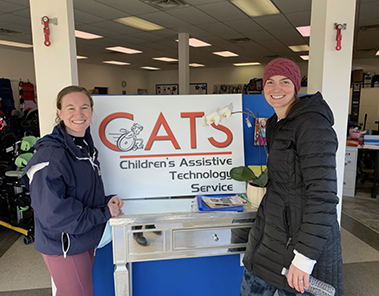
VA-LEND COHORTS COMPLETE NEW PEDIATRIC PT RESIDENCY
06/07/2021

|
May 2021 marks the first-year anniversary of the accreditation of the Pediatric Physical Therapy Residency Program at Virginia Commonwealth University. The program officially started in July of 2019 with its Director Terry Solano, PT, DPT. Solano is also a Va-LEND Faculty member and former Va-LEND Trainee. Jennifer Brashears, PT, DPT was one of two Va-LEND Trainees who were accepted into the program for the 2020-2021 academic year. "Residency programs are a relatively new idea in physical therapy, and even more so in pediatrics, so the process is competitive. Not all programs allow two residents, so this was unique and quite beneficial," said Brashears.
However, the pandemic changed everything. Solano said that due to the COVID-19 pandemic, the first year of the program they had to regroup and revise their strategies to meet program requirements and continue to provide quality care. "We have been successful at this thanks to the extraordinary efforts of the team of professionals who support the residency. While this time has been a stressor for all, unique learning opportunities presented themselves such as a transition to tele health visits for outpatient and early intervention. The workload for residents was high and with the additional challenges of working during a pandemic, the residents discovered in themselves a new level of resilience and creativity that they did not know they possessed." Solano explained.
In fact, residents spend a minimum of 28 hours in clinical practice which includes experiences in Acute Care, Outpatient, and Early Intervention. They engage in weekly formal mentorship sessions that support and assess development of clinical reasoning and progress toward specialty practice, according to Solano. This is in addition to completing the Va-LEND Program as their didactic component of the residency program. "Perhaps the most beneficial piece of LEND was the inclusion of family members of people with disabilities and disability advocates. I think sometimes as medical professionals we think we know what is best for a family and child. While we have much expertise to offer, the family and the child are the true experts. It would be negligent of us to forget to include the family/child in decision making and goals for care. The LEND experience gave me the chance to speak with families and individuals with disabilities and hear their experiences with medical professionals, both good and bad, which helped me reflect on my own interactions with families in my career so far." said Brashears.
One way, Va-LEND Trainees apply what they have learned is to create a Leadership Project at the end of the term. This could take a variety of forms, from videos to brochures to websites and more. Brashears presentation titled, "Providing Opportunities for Children with Disabilities Through Equipment Re-Use: It's The CATS Meow." Children Assistive Technology Service (CATS) is a nonprofit organization in Richmond, that takes used equipment for children, cleans it and refurbishes it so it can be used again. The pediatric equipment is then donated to families. Brashears who volunteers there, created a binder that included important and specific information about each piece equipment to help volunteers and others streamline their donation process. "When a child has the most appropriate piece of equipment, they can fully participate in desired activities like walks with their family, arts and crafts at the table with their peers, and circle time on the floor with their classmates."
In summary, the synergy between Va-LEND, and the Pediatric Residency Program at VCU is clear. One of the things Solano said she learned as the Director of the Pediatrics Residency Program is "that facilitating self-reflection and clinical reasoning is key when mentoring a professional in their journey from novice to specialist practice." Brashears offered this advice to those who have chosen a similar career path. "My advice would be to be truly present in the conversations (whether virtual or in person), and to listen more than you speak. Everyone has a story that is unique and worth hearing. I did not go into this class thinking of myself in my typical PT/educator role, rather, I thought of myself as a student and my job was to learn about the experiences of others. This helped me gain a different perspective on disability and not just think of it from a physical therapy perspective, but from a more global and holistic point of view. If we can view each patient, we see in the context of the big picture I believe we will be more successful in making sure their needs and wishes are met."